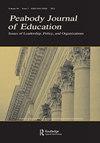“我不再觉得自己像个学生了:”学生对紧急远程教育的回应
Q2 Social Sciences
引用次数: 2
摘要
本文描述了对一所研究型大学五个大型STEM班级的1800多名学生的调查和访谈结果,当时由于COVID-19大流行,班级突然在2020年春季学期在线。我们在季度末将学生的期望与实际情况进行比较;哪些因素影响了2020年春季季度;以及2020年春季学生的学术归属感、自我效能感、参与成本和努力调节。我们通过与前几个季度的定量比较、公开调查回应和访谈,将学生的紧急远程学习(EDL)经历纳入背景。我们还研究了种族/民族、性别、第一代大学生和低收入家庭学生的异质性。我们发现,有理由预计edl后的成绩差距会扩大,但我们也发现了一些例子,这些例子表明,适应能力和自我调节能力的提高将成为学生终身的财富。我们在本文中的目标是利用一个特定背景下的探索性发现来帮助确定潜在的方法,以破坏危机加剧的教育不平等的再现和深化,以及在这个非常规时代的教育机会。本文章由计算机程序翻译,如有差异,请以英文原文为准。
“I Just Didn’t Feel like a Student Anymore:” Student Responses to Emergency Distance Learning
ABSTRACT This paper describes the results of surveys and interviews from over 1800 students in five large STEM classes at a research university when classes abruptly moved online for spring quarter 2020 due to the COVID-19 pandemic. We examine how students’ expectations compared to their realities at the end of the quarter; what factors impacted their spring 2020 quarter; and students’ academic sense of belonging, self-efficacy, cost of engagement, and effort regulation in spring 2020. We contextualize students’ experiences of emergency distance learning (EDL) through quantitative comparisons to previous quarters, open survey responses, and interviews. We also examine heterogeneity with respect to race/ethnicity, gender, first-generation college students, and students from low-income families. We find that there are reasons to expect increased achievement gaps post-EDL, but we also find examples of resiliency and improved self-regulated learning that will be life-long assets for students. Our goal in this paper is to use exploratory findings from one particular context to help identify potential ways to disrupt the reproduction and deepening of educational inequality exacerbated by the crisis, and educational opportunities in these unconventional times.
求助全文
通过发布文献求助,成功后即可免费获取论文全文。
去求助
来源期刊

Peabody Journal of Education
Social Sciences-Education
CiteScore
2.20
自引率
0.00%
发文量
43
期刊介绍:
Peabody Journal of Education (PJE) publishes quarterly symposia in the broad area of education, including but not limited to topics related to formal institutions serving students in early childhood, pre-school, primary, elementary, intermediate, secondary, post-secondary, and tertiary education. The scope of the journal includes special kinds of educational institutions, such as those providing vocational training or the schooling for students with disabilities. PJE also welcomes manuscript submissions that concentrate on informal education dynamics, those outside the immediate framework of institutions, and education matters that are important to nations outside the United States.
 求助内容:
求助内容: 应助结果提醒方式:
应助结果提醒方式:


